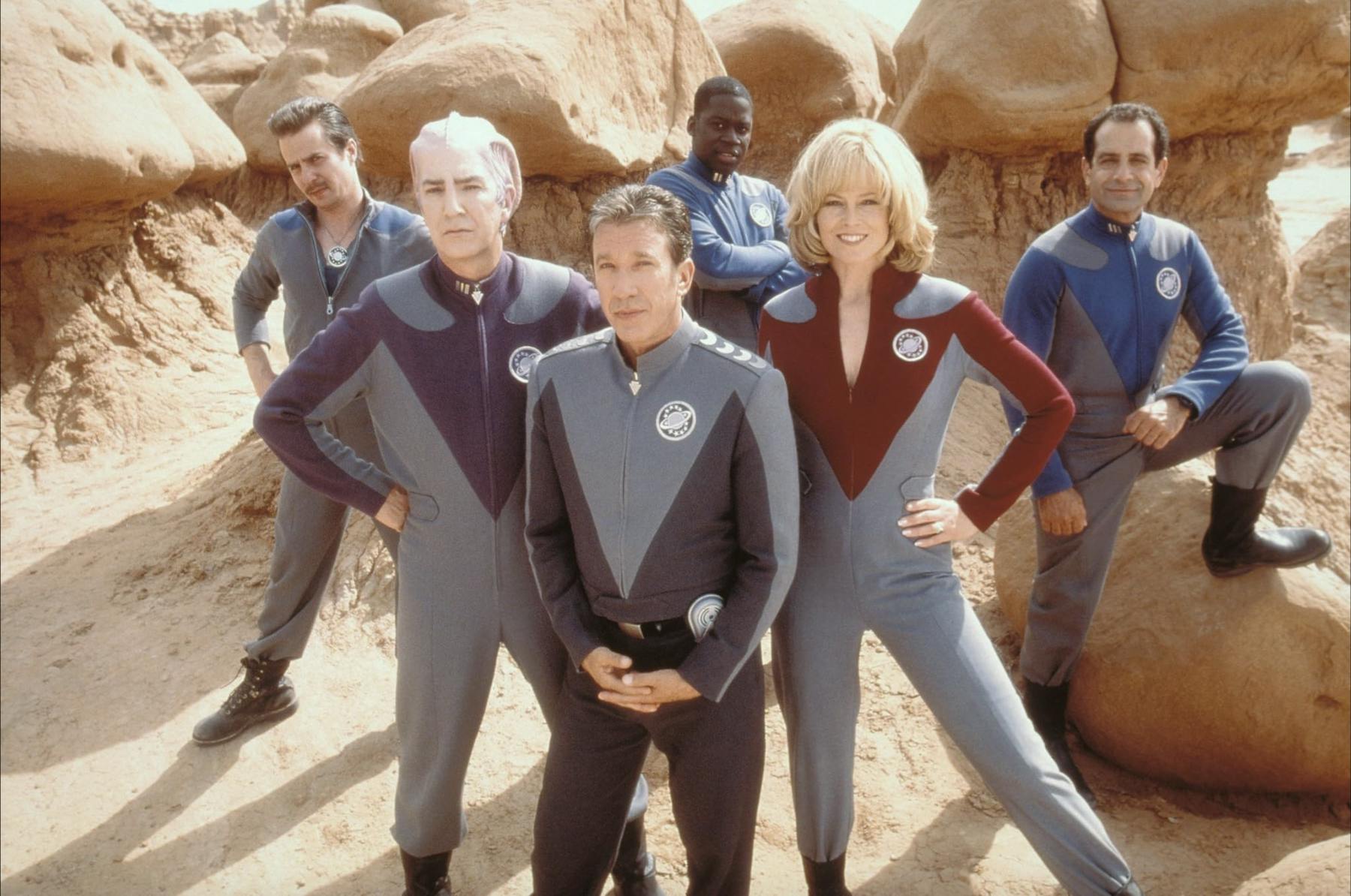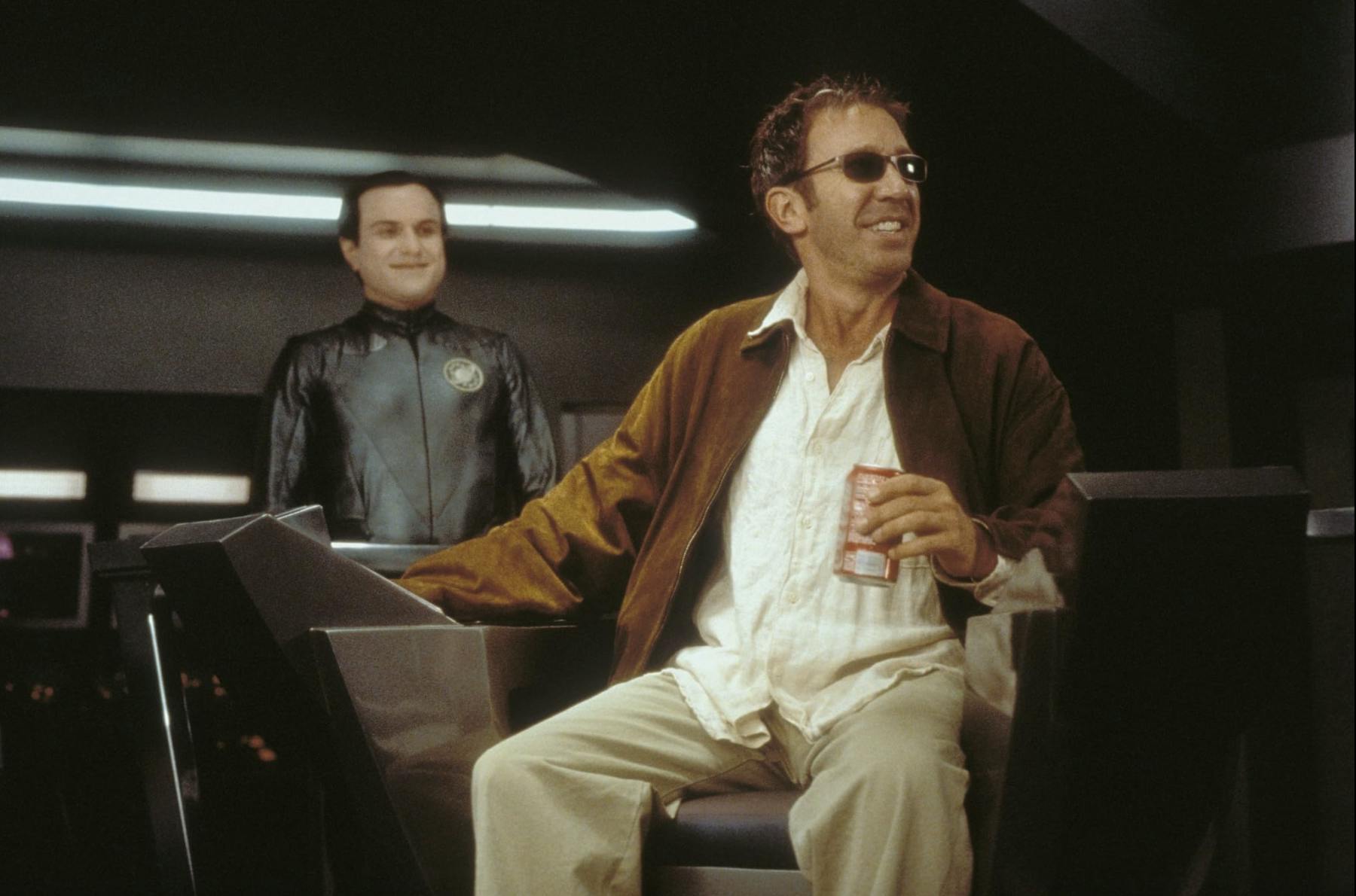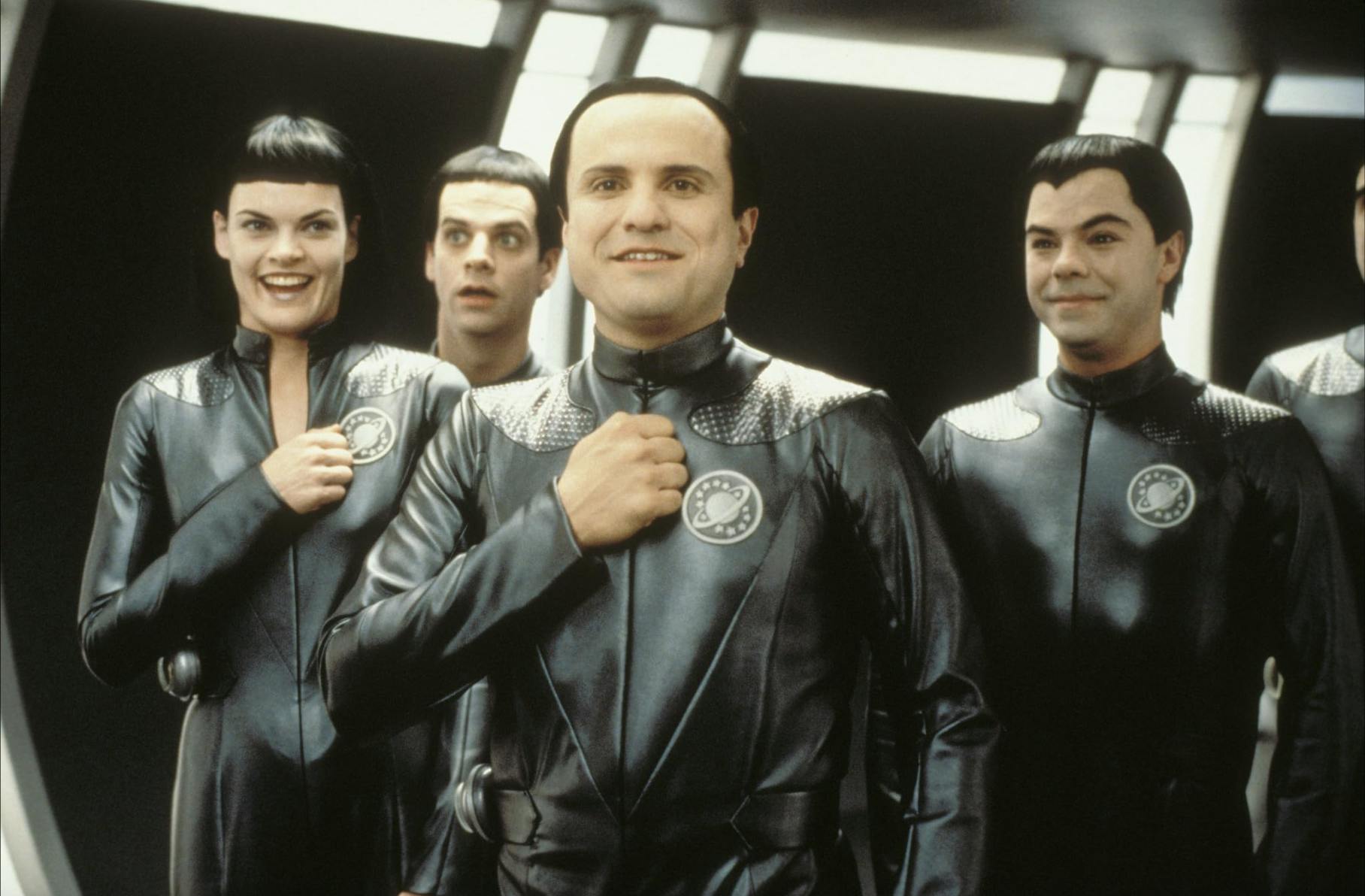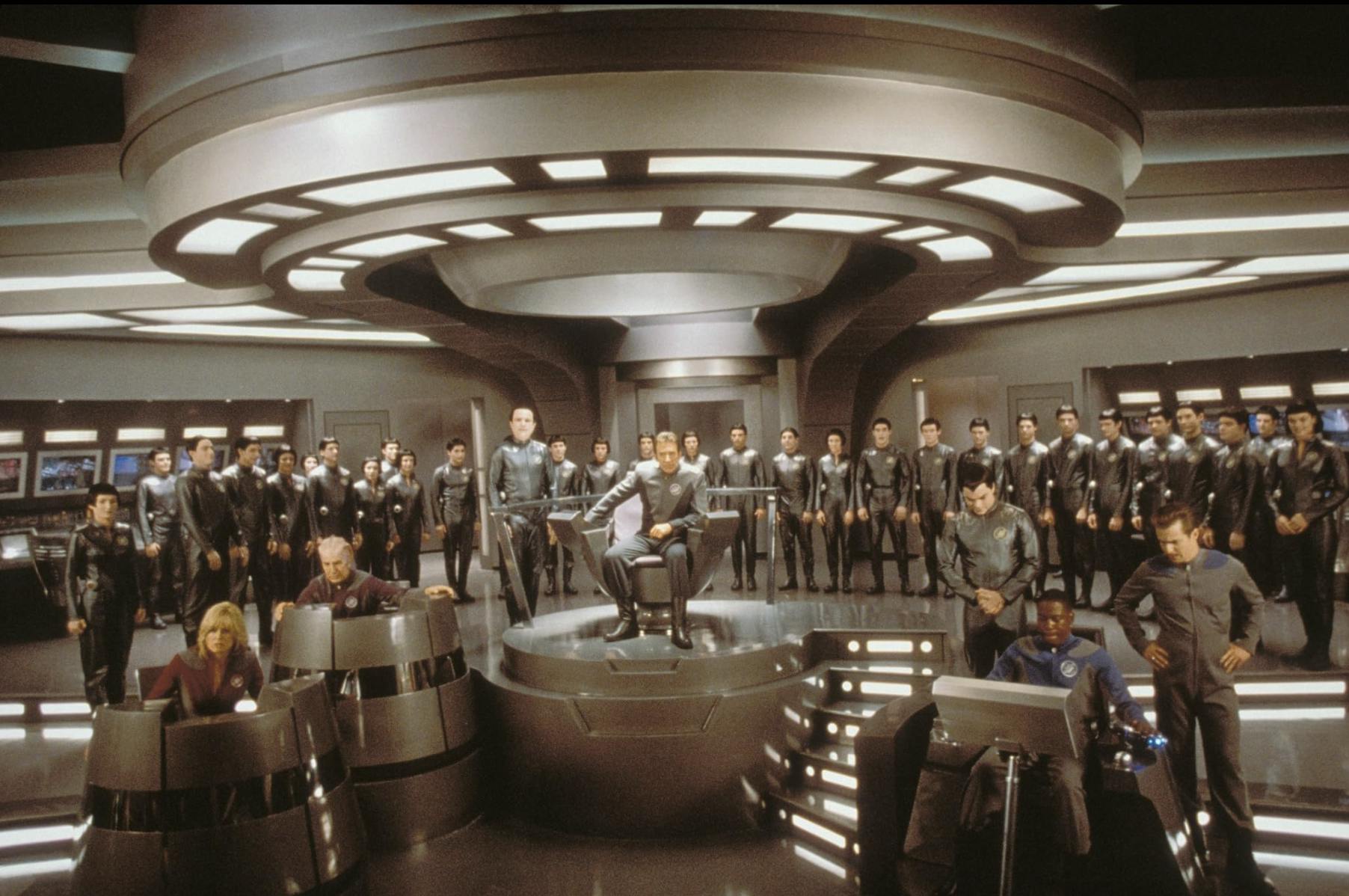Published Dec 23, 2024
25 Years Ago, A One-of-a-Kind Movie Captured the Hearts of Star Trek Fans Everywhere
'Galaxy Quest' wasn't a parody. It was a love letter.

StarTrek.com
In the winter of 1999, Star Trek fans were at a crossroads. had ended that June and a new Star Trek film was still several years away. In the year when Star Wars made a massive comeback and the sci-fi world was rocked by The Matrix, the world of Star Trek had, briefly, gotten a bit smaller. One little brave little ship that could, , was carrying the Star Trek flame, alone. Trek fans are never in a mood to be mocked, but in 1999, it's fair to say they all might have been sensitive. And so, for many, the existence of the spoof film Galaxy Quest was approached with a degree of trepidation. Even Patrick Stewart was concerned, saying, "I had originally not wanted to see [Galaxy Quest] because I heard that it was making fun of Star Trek."
But, on December 19, 1999, a few days before the general release of Galaxy Quest, at the Los Angeles premiere in Hollywood, among a few people on the red carpet were none other than Jeri Ryan and Brannon Braga. That's right. Then, reigning Star Trek royalty was right there when Galaxy Quest changed the world. And that's because the wonderful truth of Galaxy Quest is that it wasn't really a Star Trek parody at all. Instead, it was a heartfelt love letter to the entire Star Trek phenomenon. Twenty-five years later, it's still brilliant. Here's why.

Paramount Home Entertainment
Relevantly, when Galaxy Quest hit in 1999, the modern-day phenomenon of various Comic-Cons existed but hadn't exploded in the mainstream. Yes, San Diego Comic-Con was a thing in the 1990s, but the biggest type of sci-fi fan gathering throughout the U.S. in that decade were Star Trek conventions. And so, when Galaxy Quest depicted a California convention, in which fans eagerly awaited the arrival of their heroes from a bygone TV series, two decades of a very unique pop culture phenomenon were being shown on-screen, in many ways, for the first time. This wasn't the infamous 1986 Saturday Night Live sketch in which William Shatner teased that Trek fans needed to "get a life." This was something else. As the film unfolded, it invited us to get to know not just these Star Trek-ish characters, but also the fictional actor characters within this world. The meta-fictional set-up of the movie focuses on actors and fans, both things that exist in our world. But, it's in the film's early twist in which the affection for Star Trek became clear.
Within the world of Galaxy Quest, a 1980s TV series called "Galaxy Quest" was a modest success. It starred Jason Nesmith as Commander Taggart (Tim Allen), Gwen DeMarco as Tawny Madison (Sigourney Weaver), Alexander Dane as the alien Dr. Lazarus (Alan Rickman), Fred Kwan as Tech Sergeant Chen (Tony Shalhoub), Tommy Webber as Lieutenant Laredo (Daryl Mitchell). In the present, the cast is depicted as being completely associated with their characters from the ill-fated sci-fi series and locked into a series of personal appearances to make ends meet. At first, this convention circuit is presented as somewhat depressing; the fans are obsessed with the in-universe continuity of the series, and the actors are having a hard time figuring out why a sci-fi show is so important to so many people. If one only watched the first 10 minutes of the movie, fears about Star Trek fans being mocked mercilessly would have been confirmed. But then the twist comes.

Paramount Home Entertainment
After the convention, one group of fans reveals themself to Jason as being legitimate aliens from the planet Thermia. These aliens have misinterpreted the broadcasts of the TV series "Galaxy Quest" for actual "historical records." In a very Star Trek-ish concept, the Thermians have no concept of fiction or of lying, and therefore can't understand how and why "Galaxy Quest" is anything other than truth. And so, in order to save the Thermians from certain doom, and to restore the faith of their alien fans, the "Galaxy Quest" actors have to become their characters and operate a working version of their starship, the Protector.
Interestingly, the concept of actors from a Star Trek series finding themselves in an actual Star Trek setting had a precedent in early Trek fiction well before Galaxy Quest was a thing. In the 1976 book Star Trek: The New Voyages, one short story depicted William Shatner, Leonard Nimoy, and DeForest Kelley finding themselves aboard a real version of the Enterprise Trek's primary science fictional reality. Written by Ruth Berman, the short story was called "Visit to a Weird Planet, Revisited," and essentially, dealt with a similar set-up as "Mirror, Mirror," but this time, Kirk, Spock, and Bones swap universes with Shatner, Nimoy and Kelley. This story was technically a sequel to a fanfic story by Jean Lorrah and Willard F. Hunt called "Visit to a Weird Planet," published in the third issue of the original Trek fanzine, , and put Kirk, Spock, and Bones in our universe. But the more Galaxy Quest-ish story is the more famous one, mostly because in 1976, original Star Trek fiction was extremely rare.

Paramount Home Entertainment
"Visit to a Weird Planet, Revisited," in a sense, is fan fiction, but it was published in an officially licensed Star Trek book, and even featured an introduction from Majel Barrett Roddenberry. In her short essay, she wrote, "[The story] captures something more subtle: the feeling we sometimes had that the universe in which the Enterprise flew was, somehow, real — that any day you might step off the transporter and set into the corridors of the real Enterprise."
This sentiment eerily describes Galaxy Quest perfectly. It's unlikely that Galaxy Quest director Dean Parisot or writers David Howard and Robert Gordon read "Visit to a Weird Planet, Revisited," but it's interesting that their film operates on essentially the same premise: What if the Star Trek actors ended up in the real Star Trek universe? Would they see Star Trek from a different point of view?

Paramount Home Entertainment
Released to the general public on Christmas Day in 1999, there's a sense of a low-key Scrooge, Christmas Carol story embedded within Galaxy Quest. Tim Allen and Alan Rickman's characters are initially dismissive and barely tolerant of the fans and the eccentric nature of the complex lore of the show. But, by the end of the movie, the true meaning of Galaxy Quest (and Star Trek) becomes clear to them, and the audience. As Patrick Stewart added, when he did see the film "No one laughed louder or longer in the cinema than I did…. It was both funny and also touching in that it paid tribute to the dedication of these fans."
This, more than anything, is the brilliance of Galaxy Quest. It presents cinematic tension between the unreality of the Star Trek world and the very strong, and beautiful reality of its fandom. By the end of the film, the dreamers and the dream become the same thing, making the optimism of Galaxy Quest oddly even more poignant than some of the Star Trek films. The Trek franchise has always had power because we see ourselves in the characters. But what Galaxy Quest did was to make its characters out of all of us.





